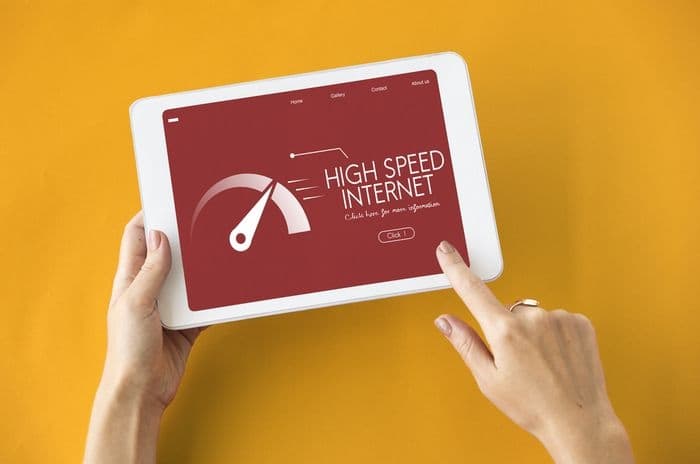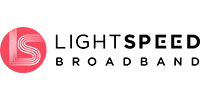Gigabit-capable broadband is now available to over 85% of UK homes, with 900Mb to 1600Mb the fastest average broadband download speed for most households.
As more networks move to full fibre technologies, providers are also starting to offer multi-gigabit speeds as well, although availability for these faster deals is more limited.
Community Fibre offer 5Gbps in London, while Vodafone offers up to 2.2Gbps in CityFibre locations, and Virgin Media offers a 2Gbps package to over 2 million homes.

At a glance: Fastest broadband
The fastest widely available broadband in the UK is now offered by Vodafone, with their new Full Fibre 1.6 plan, which offers average download speeds of 1.6Gbps to over 17 million homes on the Openreach FTTP network.
Vodafone also offers 1.8Gbps or 2.2Gbps broadband for customers who live in CityFibre enabled areas, which is over 4 million so far.
Previously, the fastest broadband was offered by Virgin Media, with their Gig1 package, which still offers faster average download speeds than most other major providers at 1.13Gbps and has availability over their entire network of 18.3 million homes.
Now, Virgin Media also offer a multi-gigabit deal, with their new Gig2 package available to 1.5 million homes and growing through their partnership with Nexfibre, as well as upgrading their own existing network.
For customers living in Virgin Media's full fibre areas, they can also now access symmetrical upload speeds for the first time on all plans as well.
Multi-gigabit broadband deals are also becoming available on smaller independent full fibre networks, including 5Gbps in London with Community Fibre, and 2Gbps+ plans in other areas:
| Download speed | Upload speed | Monthly price | Upfront price | Contract term | |
|---|---|---|---|---|---|
 |
5Gb average | 5Gb | £59 | Free | 24 months |
 |
2.3Gb average | 2.3Gb | £55 | Free | 18 months |
 |
2Gb average | 2Gb | £49.99 | Free | 24 months |
 |
2Gb average | 2Gb | £38.99 for 6 mths, then £51.99 |
£15 | 24 months |
 |
2Gb average | 2Gb | £55 | Free | 24 months |
 |
2Gb average | 200Mb Upgrade to 2Gb |
£69.99 | Free | 18 months |
 |
1.8Gb average | 1.8Gb | £60 | Free | 24 months |
 |
1.13Gb average | 104Mb Upgrade to 1.13Gb |
£39.99 | Free | 18 months |
While Virgin Media and Vodafone have nationwide availability, Community Fibre, LightSpeed, Brsk, BeFibre, and Trooli are more location specific.
Community Fibre pass over 1.3 million homes in London, and are active in 31 boroughs of the capital offering symmetrical speeds up to 5Gbps to more than one third of properties.
LightSpeed have coverage in Norfolk, Suffolk and the East Midlands, while Trooli has availability in rural and semi-rural towns across Kent, Sussex, Surrey, Hampshire, Suffolk and Cambridgeshire.
Brsk has coverage in the North West, around Birmingham, Manchester, Blackburn, Burnley, Bradford, and to the east of Liverpool.
BeFibre has even wider coverage with over 170 towns in 11 counties across England built-in.
Find out the fastest broadband available at your address:
Verdict: Which broadband provider is fastest?
The fastest broadband available to the most homes in the UK is Virgin Media's Gig1 package. It offers average download speeds at peak times of 1.13Gbps, or 1130Mb per second to over 60% of UK homes.
Ofcom's latest research into broadband speeds, published September 2023, confirmed Virgin Media's top speeds as 1115.38Mbps at peak times, so it's holding out in real-world tests too.
Vodafone's Full Fibre 1.6Gbps plan is very close behind however, with availability just short of Virgin Media's gigabit footprint, at over 17 million, and plans to reach 25 million premises by the end of 2026.
Indeed, the fastest broadband deals are evolving rapidly, with providers beginning to offer multi-gigabit packages with download speeds up to 2.5Gbps. So, while availability for these deals is more limited, customers may find faster speeds are reaching them.
Overall, our research into broadband speeds found:
- Community Fibre offer the fastest symmetrical broadband speed in the capital, with Londoners able to sign up to 5Gbps plans
- Vodafone offer one of the fastest broadband speeds with up to 2.2Gbps downloads in CityFibre enabled areas, and 1.6Gbps in Openreach full fibre areas
- BeFibre, Brsk, LightSpeed, Trooli and Virgin Media also offer 2Gbps broadband packages in some areas, while EE offer 1.6Gbps speeds in Openreach areas
- Virgin Media offer the fastest widely-available average download speed at peak times with 1.13Gbps available to over 18.3 million premises
- Symmetrical upload speeds are becoming more common, with more providers moving towards offering faster uploads
- Openreach's full fibre to the home network has faster latency rates than Virgin Media's older coaxial cable network
- Both Hyperoptic and Plusnet customers were the most satisfied with the speed of their service across two independent surveys of broadband customers
- Virgin Media offer one of the fastest whole home WiFi guarantees, promising speeds of 30Mbps in every room or money back, Community Fibre also promise wireless speeds of 50Mbps at home, although this is limited to their 1Gb and 5Gb plans
While there are pockets of even faster broadband, such as 7Gbps in select locations with YouFibre, these plans are expensive, costing £100 per month, and have even more limited availability than the new 2-3Gbps deals.
Read on to find out more about the fastest broadband in the UK, or find out what the fastest broadband in your area is.
Low-cost fast broadband deals
For those looking for the fastest broadband deal they can afford, here are some of the cheapest prices for fast gigabit-capable broadband plans:
| Package | Broadband | Monthly price | Upfront price | Contract term | |
|---|---|---|---|---|---|

|
1Gbps Fibre Broadband | 920Mb average | £25 | Free | 24 months |

|
Gig1 Fibre Broadband | 1.13Gb average | £39.99 | Free | 18 months |

|
Full Fibre 900 | 900Mb average | £36.99 | Free | 24 months |

|
Full Fibre 910 | 910Mb average | £37 | Free | 24 months |

|
Full Fibre Gigafast | 900Mb average | £43 | £5 | 24 months |
Gigabit-capable broadband is now available to over 85% of UK homes, which means most households can now access really fast broadband if they want it.
As well as becoming more accessible, gigabit broadband deals are also coming down in price too, with connections now available from as little as £25 per month - depending on location.
One of the cheapest gigabit broadband deals available at the time of writing, is offered by Community Fibre at just £25 per month. However, this is limited to areas within London.
Hey! Broadband also offer a gigabit broadband plan for just £27, and BeFibre offer gigabit broadband for £30 per month.
Other smaller independent networks including KCOM, G.Network, Quickline, and Lightspeed Broadband, also offer gigabit broadband packages for around £30 per month, but again, availability is widely location dependent.
More mainstream deals are available from household names such as OneStream, Plusnet, Sky, Virgin Media, Vodafone, TalkTalk, and BT, with prices starting at £31 per month for these options.
Prices are falling though. Within the last year we've seen gigabit deals fall in price from £50-£60, to closer to £35-£50, making them much more attractive to everyday families and larger homes who could benefit from the faster download speeds on offer.
For the latest pricing on the fastest broadband in your area, see our comparison page where you can check your postcode and order by Broadband Speed, Special Offer, or Lowest Price depending on your requirements.
Fastest broadband in your area
The fastest broadband you can get depends upon the networks available in your area, as well as the location of your property, for example how far away it is from the nearest exchange or street cabinet.
While fibre to the home connections mostly mitigate distance, it can still play a part, especially in areas where full fibre has yet to reach and customers are reliant on superfast fibre to the cabinet connections.
Virgin Media completed their network upgrade to gigabit speeds at the end of 2021, making it the most widely available gigabit-capable broadband in the UK. They currently pass over 18.3 million premises, around 60% of UK homes, and have plans to further extend their network to a total of 23 million by the end of 2025.
Gigabit broadband overall, considering all networks, has so far reached over 83% of homes (according to Ofcom figures), and the Government aims to cover 85% by the end of 2025 (which according to ThinkBroadband it already has), and 99% by the end of 2030.
This is being achieved by full fibre networks including Openreach, who have passed over 16 million premises so far, CityFibre who have passed over 4 million, and a number of other independent networks including Hyperoptic, Community Fibre, and rural specialists like Gigaclear and Fibrus.
Ultimately the fastest broadband you can get depends on where you live and what's been made available to you so far.
To find out, enter your postcode in our broadband checker tool below to see the fastest broadband packages available for your home.
You can also use our full broadband availability checker, which can order results by speed as well as cost, and filter out what's most important to you.
Fastest broadband in London
People living in London have a little extra choice for their broadband provider thanks to dedicated London providers like Community Fibre and G.Network. As a densely urban area it also has good Virgin Media coverage, as well as Hyperoptic, and there is plenty of Openreach full fibre availability too.
Community Fibre offer the fastest broadband in London achieving 5Gbps average download speeds at peak times on their top-tier plan. The package currently costs £59 a month, offers symmetrical speeds and comes bundled with the Premium WiFi whole home coverage add-on.
New packages from Vodafone offering 1.6Gbps in Openreach full fibre enabled areas is also likely to be available to many homes throughout London. This currently costs from £70 per month, but includes the latest WiFi 6E router and WiFi booster. Vodafone pay monthly mobile customers can also save an extra £4 per month with Vodafone Together.
Hyperoptic also have good availability across London, although their fastest broadband plan, Hyperfast, only achieves 900Mbps on average at peak times. Yet, like Community Fibre, it also offers symmetrical upload speeds, so it's faster for uploading data than Virgin Media Gig1 or Vodafone's new 1.6Gbps plan, despite these both having faster download speeds.
The fastest broadband in London includes:
| Download speed (average) | Upload speed (average) | |
|---|---|---|
| Community Fibre | 5Gb | 5Gb |
| Vodafone | 1.6Gb | 105Mb |
| Virgin Media | 1.13Gb | 104Mb |
| TalkTalk | 944Mb | 110Mb |
| Hyperoptic | 900Mb | 900Mb |
Read more about the best broadband in London, and check availability for the fastest broadband in your area.
Fastest broadband in the UK
While Virgin Media offer the fastest widely-available average download speed, there are multiple factors that go into a fast-broadband experience, including upload speed and latency.
We can also look at jitter rates and existing customer satisfaction to get a more well-rounded look into how broadband providers are performing in terms of speed.
Average download speeds
Broadband providers can now only advertise speeds that at least 50% of their customers are actually receiving during the busiest times of 8pm to 10pm in the evening. As such, advertised average download speeds are now a much better indication of the speeds a broadband provider is delivering.
We can see from this then, that the fastest widely available broadband in the UK is offered by Virgin Media, as at least 50% of their customers achieve a download speed of 1.13Gbps during peak times. Virgin Media also offer a 2Gbps connection, but availability is more limited at around 2 million homes, and Vodafone offer a 1.6Gbps connection via Openreach to around 17 million homes.
Here are some of the fastest broadband providers in the UK based on average download speeds experienced by the majority of their customers between 8pm and 10pm:
| Average download speed between 8pm and 10pm | UK availability | |
|---|---|---|
| Community Fibre | 5Gb | 1.3 million+ |
| Vodafone | 1.8Gb - 2.2Gb | 4 million+ |
| Virgin Media | 2Gb | 2 million+ |
| Vodafone | 1.6Gb | 17 million+ |
| EE | 1.6Gb | 17 million+ |
| Virgin Media | 1.13Gb | 18.3 million+ |
| TalkTalk | 944Mb | 22.3 million+ |
| BT | 900Mb | 17 million+ |
| Sky | 900Mb | 17 million+ |
TalkTalk and Vodafone use a combination of Openreach FTTP and CityFibre to deliver their gigabit broadband, while BT, Sky and EE only use Openreach FTTP.
Virgin Media currently have the greatest availability for gigabit broadband, passing over 18.3 million premises, and are also now offering 2Gb broadband through new full fibre connections with Nexfibre to over 2 million homes so far.
Upload speeds
While we focus primarily on download speeds to determine the fastest broadband provider, upload speeds vary widely too.
It's also the case that upload speeds are becoming more important, with more users sending data back to the Internet when carrying out activities including online gaming, video calling, content production, backing up data, and working with shared cloud files.
The latest full fibre technology - XGS-PON - enables providers to offer symmetrical upload speeds for the first time, which means uploads are as fast as the headline download speed.
However, for many older technologies, including GPON full fibre used by Openreach providers, upload speeds are asymmetrical and therefore much slower.
Here are the upload speeds for the fastest broadband packages:
| Average download speed between 8pm and 10pm | Upload speed | |
|---|---|---|
| Community Fibre | 5Gb | 5Gb |
| Vodafone | 1.8Gb - 2.2Gb | 1.8Gb - 2.2Gb |
| Virgin Media | 2Gb | 2Gb / 200Mb |
| EE | 1.6Gb | 120Mb |
| Vodafone | 1.6Gb | 105Mb |
| Virgin Media | 1.13Gb | 104Mb |
| TalkTalk | 944Mb | 944Mb / 110Mb |
| BT | 900Mb | 110Mb |
| Sky | 900Mb | 90Mb |
Virgin Media's new 2Gb broadband plan comes with 200Mb upload speeds as standard, but users can opt for an upload speed boost add-on to get 2Gb symmetrical speeds.
Openreach FTTP, including the newer 1.6Gb plan offered by EE, has notably slower asymmetrical upload speeds however, without the option to increase these. This is due to the older technology being used, and is the same case in older areas of Virgin Media's network where coaxial cable is used.
As more of the smaller independent networks are installing faster XGS-PON full fibre technology as standard, alt-nets, including Hyperoptic, Community Fibre and more recently Trooli, offer faster symmetrical uploads already.
There are also new reports that Openreach is planning to offer a symmetrical 1Gbps plan in select areas from April 2025, although it could take a while before this becomes nationwide due to Openreach mainly using GPON so far, which doesn't support symmetrical uploads.
Real-world broadband speed research
Ofcom's latest research into broadband speeds, published September 2023, has reported on Virgin Media's fastest Gig1 package for the third time now, as well as several full fibre packages on the Openreach FTTP network.
Only the biggest providers are included in Ofcom's research, which means Virgin Media Gig1 and BT Full Fibre 900 are the only gigabit-capable packages reported on. However, while we can't directly compare the results with a wider range of equivalent packages, we can use the research to confirm whether or not Virgin Media and BT are delivering their advertised speeds in real-world tests.
Here are the five fastest packages included in the report:
| Average download speed between 8pm and 10pm | Average download speed over 24 hours | |
|---|---|---|
| Virgin Media Gig1 | 1115.38Mb | 1137.08Mb |
| BT Full Fibre 900 | 919.10Mb | 925.69Mb |
| Virgin Media M500 | 516.86Mb | 539.55Mb |
| Sky Ultrafast Plus | 484.14Mb | 483.86Mb |
| Gigaclear 300Mb | 296.81Mb | 309.88Mb |
Virgin Media's Gig1 plan achieved average download speeds at peak times marginally slower at 1115.38Mbps than their listed average speeds of 1130Mbps, but higher over 24 hours at 1137.08Mbps.
Back in October 2022, when Ofcom first reported on real world speeds for the Gig1 plan, they found average download speeds of 1134.83Mb per second at peak time, so the performance has dropped ever so slightly.
Ofcom's panel base for the Virgin Media Gig1 plan was just 100 customers, yet it's reassuring they reported receiving close to the same average download speeds as the provider advertises.
Virgin Media's other packages, such as M500 and M350 also performed well, both beating their advertised average speeds at peak times. BT's full fibre to the premises plan exceeded its advertised average speeds at peak times at 919.10Mb.
Satisfaction with speed of service
Choose carries out independent surveys of broadband customers. We ask customers to rate their provider out of 5 for whether they felt they experienced good broadband speeds, and additionally if they felt their Internet connection was generally stable.
| Speed (4 or above) | Reliability (4 or above) | ||
|---|---|---|---|
| 1 | Hyperoptic | 87% | 77% |
| 2 | Zen Internet | 80% | 90% |
| 3 | KCOM | 74% | 75% |
| 4 | Virgin Media | 63% | 62% |
| 5 | Plusnet | 60% | 62% |
| 6 | BT | 56% | 67% |
| 7 | Vodafone | 55% | 57% |
| 8 | NOW Broadband | 53% | 61% |
| 9 | TalkTalk | 51% | 59% |
| 10 | Sky | 49% | 62% |
| 11 | EE | 47% | 54% |
Hyperoptic had the most customers who were happy with the speed of their broadband service, with 87% rating them 4 or above out of 5. 77% of their customers also rated them 4 or above for the stability of their Internet connection.
As a full fibre provider, all of Hyperoptic's customers are on fibre to the premises connections, so this stands them in good stead for delivering fast broadband. This is also true for KCOM in Hull and Virgin Media, who also scored well for customer satisfaction with the speed of their broadband service in this survey.
It's worth bearing in mind, many of the other providers surveyed also offer fibre to the cabinet, as well as copper broadband, and so less customers are on ultrafast lines to begin with.
Zen Internet and Plusnet scored the highest out of the providers who also offer FTTC and copper connections. Plusnet have also proven themselves to be one of the most reliable broadband providers, winning our industry award for reliability in 2022.
We can also look at another independent survey of broadband customers, carried out by Ofcom, from May 2023.
| Satisfaction with speed of service | Satisfaction with service overall | ||
|---|---|---|---|
| 1 | Plusnet | 83% | 89% |
| 2 | Vodafone | 82% | 83% |
| 3 | Virgin Media | 82% | 81% |
| 4 | EE | 81% | 85% |
| 5 | BT | 80% | 83% |
| 6 | Sky | 80% | 82% |
| 7 | TalkTalk | 76% | 78% |
| Industry average | 80% | 82% |
Ofcom found Plusnet had the most customers satisfied with the speed of their broadband service at 83%, with Vodafone, Virgin Media and EE all performing better than the industry average of 80%.
In addition, customers of Plusnet and EE had greater satisfaction with their service overall than the industry average. Although it's worth bearing in mind Sky and EE perform the best for customer service, and satisfaction overall is affected by more than just broadband speed.
Overall, from these two independent surveys we can say Hyperoptic, Zen Internet, KCOM, Virgin Media and Plusnet are all performing well in terms of customer satisfaction with how fast their broadband service is.
Latency
A high latency rate, or ping, indicates that individual packets of data are being delayed and can contribute to a slower broadband experience. As with upload speeds however, latency really only affects a few Internet activities.
Online activities where a very fast response rate is required, such as online gaming, and video calls to some extent, may notice slow latency. For example, where a user inputs a movement to their gaming character, slow latency could mean they get fragged first, even if the user actually reacted first.
For BT's fibre to the premises and Virgin Media, we can compare latency rates from independent research by Ofcom, to get an even more granular look at which providers are actually the fastest.
| Latency (lower is better) | Users tested | |
|---|---|---|
| Virgin Media Gig1 | 14.84 | 100 |
| BT FTTP 900Mb | 6.93 | 59 |
| Virgin Media M500 | 12.51 | 100 |
| Sky FTTP 500Mb | 6.58 | 142 |
| Gigaclear FTTP 300Mb | 4.88 | 44 |
Virgin Media customers reported noticeably slower latency figures than those of BT on their full fibre to the premises (FTTP) packages. In fact, Virgin Media's latency rates were slower than all of the Openreach fibre to the cabinet (FTTC) packages in the report too, with BT and Plusnet's FTTC packages reporting latency rates of 10.25 and 10.07 respectively.
However, it's worth noting this data is based on Virgin Media's older coaxial cable connections, which they plan to upgrade to full fibre by the end of 2028, and also doesn't apply to newer full fibre locations where Nexfibre has extended Virgin Media coverage.
Jitter
Where latency can indicate a slower broadband experience for some activities, high jitter rates provide more of an indication of a slow or faulty broadband connection.
| Jitter (lower is better) | Users tested | |
|---|---|---|
| Virgin Media Gig1 | 0.39 | 99 |
| BT FTTP 900Mb | 0.03 | 59 |
| Virgin Media M500 | 0.17 | 100 |
| Gigaclear FTTP 300Mb | 0.61 | 44 |
Openreach full fibre provided by BT had lower jitter rates at just 0.03 to 0.07, compared to Virgin Media who had jitter rates of 0.17 to 0.39 across their M350 to Gig1 packages.
For jitter however, Virgin Media did perform better than rural alt-net Gigaclear, who reported a jitter rate of 0.61 over 24 hours on their full fibre connection.
Overall then, while Virgin Media offer the fastest widely available broadband in the UK, other factors can contribute to the speeds a user experiences, including both upload speeds and latency, and for these metrics Virgin Media's older coaxial cable network is beaten by newer full fibre connections.
Speed guarantees
Since Ofcom established a voluntary code on broadband speeds in 2020, which sets out a requirement to provide a minimum speed, several broadband providers now commit to minimum speed guarantees, while others go beyond this to offer their own unique guarantees on speed.
Minimum speed guarantees
So far, nine broadband providers have signed up to Ofcom's code, including BT, EE, Plusnet, Sky, NOW Broadband, TalkTalk, Utility Warehouse, Virgin Media and Zen Internet.
The code requires providers to give customers a minimum guaranteed download speed at the time of purchase, and if this speed is subsequently unmet, the customer should be free to leave their contract without penalty.
Looking at the providers with the fastest average download speeds, we checked the minimum guaranteed speeds for each of the providers:
| Advertised average download speed | Minimum guaranteed download speed | |
|---|---|---|
| Virgin Media | 2000Mb | 1000Mb |
| Vodafone | 1800Mb | 900Mb |
| EE | 1600Mb | 1300Mb |
| Vodafone | 1600Mb | 800Mb |
| Virgin Media | 1130Mb | 565Mb |
| TalkTalk | 944Mb | 725Mb |
| BT | 900Mb | 700Mb |
| Sky | 900Mb | 600Mb |
| Vodafone | 910Mb | 455Mb |
Note that while Vodafone list a minimum speed and say if customers don't get that speed and they can't resolve the issue within 30 days they can leave penalty free, they're not yet signatories of the voluntary code of practice.
To obtain the minimum speeds we used the same location in Brighton. However, note that minimum speeds could vary depending on location.
It's worth bearing in mind each provider may have different policies in terms of how they set minimum guaranteed speeds, although those signed up to the code of practice should personalise them to individual properties.
However, from this, we can see that TalkTalk, BT and Sky provide more generous minimum speeds, while Virgin Media and especially Vodafone are much more conservative, which could indicate increased chances of a slower experience for some customers.
WiFi speed guarantees
While the fastest broadband speeds will always be experienced over wired connections via ethernet cables directly to the router, most people will use WiFi at home, especially for devices such as mobiles and tablets, but even laptops are likely to be used wirelessly.
Broadband providers have been increasingly offering 'WiFi guarantees' as added extras with their broadband plans, effectively promising minimum download speeds throughout an entire house, or some money-back (sometimes) if the provider fails to deliver.
By making use of mesh technology in newer routers, providers offer these guarantees on the basis they'll provide free mesh extenders that can now seamlessly extend a wireless network around larger homes.
Overall, we know Virgin Media offer one of the fastest guaranteed WiFi speed of 30Mbps in every room, or customers get a £100 bill credit. They also provide the guarantee for free for customers on their fastest Gig1 and Gig2 plans, as well as Volt customers.
Community Fibre also offer 50Mbps in every room but their Premium WiFi add-on is restricted to 1Gb and 5Gb customers. Meanwhile, Sky promise 25Mbps on their WiFi Max plan for full fibre customers.
We've more details on each provider's broadband speed guarantee in this guide, which compares the relevant details and what each provider will offer if they fail to deliver minimum WiFi speeds around a customer's home.
Gigabit broadband rollout
As we've seen, the fastest broadband in the UK is primarily based on gigabit broadband deals from various networks, and while coverage is now over 85%, these faster connections are still being rolled out.
However, all of the networks have ambitious roll out plans and targets including Virgin Media, who recently announced a £4.5 billion investment to bring their broadband to an additional 7 million premises and increasing their coverage from 55% to 80% of the UK.
Virgin Media also committed in 2021 to upgrading their entire network to fibre to the premises by the end of 2028, and have now started switching on new sections of network using the latest XGS-PON technology, which supports download speeds up to 10Gbps.
Openreach, who provide broadband to BT, TalkTalk, Sky, EE, Plusnet and others, have a smaller footprint than Virgin Media in terms of gigabit broadband. However, they intend to extend their full fibre network to 25 million premises by the end of 2026, which would surpass both Virgin's current and planned coverage.
CityFibre, a full fibre network resold by both TalkTalk and Vodafone has now reached over 4 million premises, however they too have rapid expansion targets, aiming to reach 8 million by the end of 2025.
There are also impressive coverage plans being announced by the smaller full fibre providers too. Community Fibre, who so far pass 1.3 million homes in London, and have more recently merged with Box to offer coverage in Surrey and Sussex too.
Hyperoptic, who've now passed 1.15 million premises, also aim to cover 2 million homes by the end of 2023. While Gigaclear, a rural full fibre provider, aim to reach 500,000 premises by the end of 2024, building on their existing footprint of over 380,000 premises.
We can see then there are multiple full fibre networks aiming to achieve the Government's gigabit broadband target of nationwide availability by 2030. Although, as with superfast broadband which has now reached over 98% coverage, it's the final few areas that are the hardest to reach, with 5G mobile broadband likely needed to fill in some gaps.
What broadband speed do you need?
Ofcom's latest Connected Nations 2024 report, estimated full fibre take-up where it was available has now risen to 35%. However, they also said just 17% of those where full fibre was available signed up to gigabit broadband packages, with most households (39%) choosing 100Mbps plans.
While the gigabit broadband roll-out is helping to future proof the UK, these low take-up figures do raise the question as to whether or not the majority of broadband customers really need gigafast broadband speeds.
It's true that for most households, fibre broadband connections between 35Mb and 70Mb are more than adequate. And its only really heavy Internet use, where multiple people are using the Internet at the same time where faster speeds are more needed.
Online gamers need responsive broadband connections with low latency and high reliability, but even this could be achieved with full fibre packages from 50Mb to 100Mb
Even 4K Ultra HD streaming is said to only need a minimum broadband speed of 30Mb.
Where these ultrafast and gigafast packages can help however, is when we have a large household where multiple people are using the Internet at the same time for different activities.
Here are some examples of minimum broadband speed requirements:
| Minimum speed requirement | |
|---|---|
| Streaming 4K video | 30Mb |
| Streaming HD video | 5Mb (Sky say 25Mb) |
| Online gaming (Xbox or Playstation 5) | 3Mb minimum |
| Downloading games | 50Mb recommended |
| Zoom video calling in HD | 3.8Mb for 1080p |
As you can see, you don't need massively fast broadband to carry out most online activities. However, a slow connection can be frustrating and won't support multiple users trying to do anything at the same time.
The 3Mb minimum speed requirements for online gaming and zoom above come from the manufacturers themselves. However, we'd consider these speeds to be absolute minimums, and are unlikely to result in the best experience.
Read more about what broadband you need in this guide.
Frequently Asked Questions
What's the fastest broadband plan in the UK?
Vodafone now offer the fastest widely available broadband in the UK, with average download speeds at peak times of 1.6Gb per second, and availability across 17 million homes. An additional 4 million homes can also access 1.8Gbps or 2.2Gbps with Vodafone where CityFibre has rolled out.
Where is gigabit broadband available?
Gigabit broadband speeds are now available to over 85% of the UK, with coverage varying between urban and rural areas thanks to funding from the Government under the Project Gigabit scheme, as well as dedicated rural providers like Fibrus, Gigaclear and B4RN.
What is the fastest broadband possible?
YouFibre offer some residential properties on their network speeds of up to 7000Mbps, or 7Gbps, if they want them. This plan was previously reserved for business customers, and costs from £99 per month, so it's an expensive option. YouFibre is also only available to 130,000 premises so far. Most households would find 1Gbps packages more than enough and cost from as little as £25 per month.
How fast can Virgin Media's network actually go?
Virgin Media have been upgrading their entire network to fibre to the premises technology that can theoretically achieve symmetrical 10Gbps download and upload speeds. They've also now launched a 2Gbps broadband plan, with optional symmetrical 2Gbps upload speeds too, although availability is not as wide as their Gig1 plan.
What's the fastest router for the best WiFi speeds?
The latest WiFi 7 protocol is capable of delivering speeds of up to 46Gbps across multiple wireless channels, although it's unlikely real-world speeds would be this fast. WiFi 7 routers also offer tri bands, with the additional 6GHz channel offering increased coverage with less interference. We look at a range of WiFi 6E and 7 routers that can help improve broadband speeds here.
Summary: Who is the fastest provider?
Vodafone offer the fastest broadband with their new 2.2Gbps package where users will also receive symmetrical 2.2Gbps upload speeds. However, so far, it's only available in select locations on the CityFibre network of 4 million premises.
Virgin Media also offer a fast broadband deal with their 2Gbps Gig2 package, and uploads can be boosted to symmetrical speeds for an extra £6 per month. This plan is limited to around just 2 million premises so far, although it should reach more homes as Virgin Media updates their existing network to full fibre.
More widely-available fast broadband is their Gig1 package, which delivers 1.13Gbps download speeds at peak times and is available to the rest of their network, over 18.3 million premises, or 60% of UK homes.
Other fast broadband packages are available from both smaller independent networks, and Openreach through Vodafone's 1.6Gbps plan. However, availability varies widely and even Openreach full fibre is only available to 17 million premises so far.
Ultimately, location still matters for fast broadband and prospective customers should carry out checks in their area to see what's available as full fibre continues to roll out and existing networks are upgraded to faster speeds.
However, as we've seen, download speeds aren't the only factor to consider when looking for the fastest broadband.
We also found Hyperoptic, Plusnet and TalkTalk performed well in various metrics related to broadband speed and customer experience.
Symmetrical upload speeds from providers including Hyperoptic and Community Fibre may offer a better all-round broadband experience for some users, and online gamers may want to ensure their provider has low latency rates, such as Openreach FTTP providers like Plusnet and TalkTalk.
Satisfaction among existing customers relating to the speed of their service is also a worthwhile factor to consider, with Hyperoptic and Plusnet performing the best across two independent surveys.
To read more on choosing the right broadband provider, see our guide to the most reliable broadband and the best broadband for gaming.
We've also got more on ultrafast broadband, including how it works and where it's available.









Comments